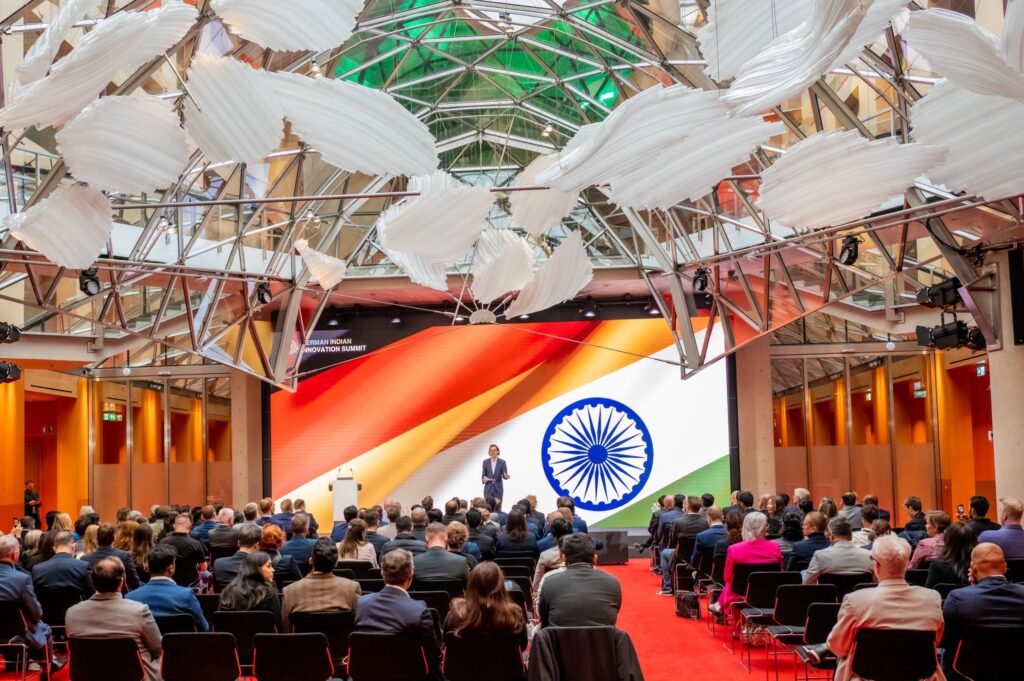
Berlin, 6 October 2025 – The AXICA Congress Center at the Brandenburg Gate became a hub of international exchange as more than 300 leaders from business, academia, and government gathered for the German Indian Innovation Summit 2025 (GIIS). Under the theme “Forging an Indo-European Innovation Corridor for a Safe and Sustainable Future,” the event underscored the growing strategic partnership between Germany and India in fields such as artificial intelligence, GreenTech, digital transformation, Industry 4.0, HealthTech, and cybersecurity.
India’s Ambassador to Germany, Ajit Gupte, opened the summit by highlighting the deepening trust and shared priorities between the two nations. In her keynote address, Prof. Dr. Gesine Schwan stressed the social and political responsibility of innovation as a driver of peace, stability, and sustainability. Dr. Vijay Chauthaiwale emphasised that “India and Europe share a common vision of leveraging innovation to address global challenges. From digital transformation to green technologies, our collaboration has the potential to set benchmarks for inclusive growth.”
Jan Lachenmayer, Chair of the German Indian Innovation Council (GIIC), described the summit as a milestone in building a lasting innovation corridor between India and Europe. Two significant announcements were made: the launch of the German Indian Open Innovation Initiative and the establishment of the German Deep Tech House in Madhya Pradesh – both aimed at deepening technological collaboration and fostering shared entrepreneurship.
A series of high-level discussions reflected the breadth of topics shaping the bilateral agenda. In the Mobility & Transport panel, Prof. Dr. Alexandra Mikityuk (Staex), Rohan Chhatwal (Maruti Suzuki), Dr. Şilan Hun (Siemens Mobility), and Volker Ratzmann (DHL Group) examined smart cities, sustainable logistics, and digital infrastructure. The AI Expert Conversation, featuring Dr. Gunter Gemmel, Karthikeyan Muthukumar, Nikolas Adamopoulos, and Onkar Ambekar, explored both the promises and ethical challenges of artificial intelligence and introduced the new Democratic AI Alliance. Additional sessions focused on venture capital, DeepTech, and the evolving future of work between start-ups, research institutions, and industry.
The Spotlight Dialogues brought together influential voices from business, science, and media for open and candid exchanges. Anandi Iyer, Director of the Fraunhofer Office India and recipient of the Federal Cross of Merit, spoke with Axel Deniz (Bosch Business Innovation) about the intersection of research, corporate leadership, and sustainability. Dr. Björn Bernhard (Rheinmetall) and Amit Kalyani (Bharat Forge) discussed industrial transformation, while Jörg Johannes Müller, former CEO of Volkswagen India, joined journalist Kartik Malhotra in reflecting on cross-cultural collaboration and communication.
Further contributions from Dinesh Khara, former Chairman of the State Bank of India, Bettina Schaller (Adecco Group), Jose Jacob K (The India Advantage Summit), and Dr. med. Lara Maier, who presented new intersections between Ayurveda and modern medicine, underscored the diversity of topics linking the two nations – from finance and workforce transformation to health and well-being.
The German Indian Innovation Summit 2025 marked not an endpoint but a beginning. The connections forged in Berlin are expected to translate into tangible partnerships and projects over the coming year, strengthening what organisers described as an emerging Indo-European innovation corridor. With a shared commitment to collaboration, sustainability, and knowledge exchange, Germany and India have taken another decisive step towards shaping a more interconnected global innovation landscape. The next GIIC Summit is already scheduled for 2026.






